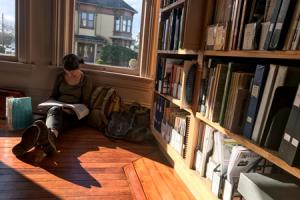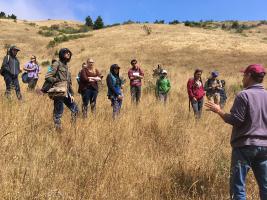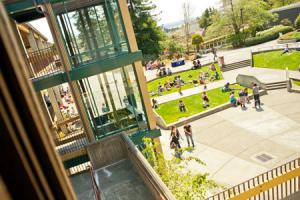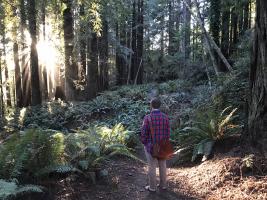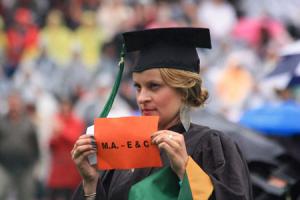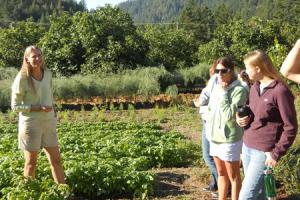Fall 2017
This interdisciplinary speaker series is intended to stimulate cross disciplinary discussion, debate, and collaboration around issues related to energy, the environment, and society. The series is sponsored by SERC and the Environment & Community Graduate Program. For details on upcoming events or to request accessibility accommodations, email serc@humboldt.edu or call (707) 826-4345.
Unless otherwise noted, events are on Thursdays from 5:30-7:00 pm in Founders Hall 118.
You can watch most SERC-sponsored talks on SERC’s YouTube Channel, or via the direct links below. Videos of most presentations are also available to check-out from the Humboldt Library (index of available DVDs) or download via Humboldt Digital Scholar.
Fall 2017
August 31: Debbie Page-Dumroese, "Using biochar to improve soil resilience and sequester carbon"
For the opening presentation in this fall's Speaker Series, soil scientist Debbie Page-Dumroese will discuss the use of biochar to sequester carbon and improve soil resilience. Biochar is a porous, high-carbon material derived from exposing biomass to temperatures above 500°C in a low-oxygen environment. The resultant “char” is typically used as a soil amendment to increase water-holding capacity and nutrient retention.
Page-Dumroese has been a Research Soil Scientist with the USDA Forest Service Rocky Mountain Research Station for over three decades. Her work focuses on long-term soil productivity after harvest operation, sustainable harvesting, wood decomposition, and biochar. For the last ten years, she has been investigating the potential to reduce slash pile burns and limit wildfire risks by using onsite biochar conversion technologies.
September 7: Ken Liberman, "Can 'Nature' teach anything?"
Ken Liberman argues that environmental studies has been burdened with perspectives that have failed to afford access to the actual experience of living in a landscape, and that dualist and nondualist inquiries alike are plagued by anthropocentrisms that seem impossible to escape. This lecture explores how we can investigate the relation of humans and landscapes in ways that preserve what really occurs there, and begin to open those lived phenomena to rigorous scrutiny. To this end, resources are drawn and synthesized from the thinking of Georg Simmel, Martin Heidegger, Maurice Merleau-Ponty, and Jacques Derrida, as well as Liberman's field research about nature, scientific praxis, human identity, and anonymity.
Kenneth Liberman is Professor Emeritus of Sociology at the University of Oregon. For ten years he served as Chair of the Board of Directors of the International Association for Environmental Philosophy, and he is presently Co-Chair of the ASA's Section on Ethnomethodology. He has published sixty articles and eight books. His "More Studies in Ethnomethodology" (SUNY, 2013) won an ASA Distinguished Book Award. He has led one thousand people on backpacking trips on four continents, and has lived with traditionally oriented Aboriginal people in Central Australia for two years and Tibetan refugees in India for four years.
September 28: Nick Goulette, "Imagining and achieving the potential of community-based forestry in Northern CA"
As The Watershed Center’s executive director, Nick Goulette oversees programs focused on forestry, fire and fuels, watershed and fisheries, youth engagement, enterprise development, policy, and research. Over the past thirteen years with the Center, Goulette has worked on a wide range of collaborative projects. He is the Chair of the Northern CA Prescribed Fire Council and a long-time member of the leadership team for the Rural Voices for Conservation Coalition. He also helped establish the CA Forest Biomass Working Group and the CA Statewide Wood Energy Team, and worked with the design and launch of the national Fire Adapted Communities Learning Network.
Goulette was born and raised in Maine and received a B.S. in Forestry from the University of Vermont with a concentration in Community-Based Forestry. He now lives with his wife Naomi on a homestead in Weaverville, California.
October 5: Amy & Daniel Cordalis, "Breathing life back into the Klamath River"
Amy Cordalis is General Counsel for the Yurok Tribe. She comes from a long line of Yurok Indians from the village of Requa at the mouth of the Klamath River, who have fought for Yurok rights: her great-uncle's Supreme Court case, Mattz v. Arnett, confirmed the Yurok Reservation as Indian Country and set the stage for the Tribe's federally reserved fishing and water rights. Cordalis received her undergraduate from the University of Oregon and her JD from the University of Denver College of Law. Before returning home to work for the Yurok Tribe in 2014, Cordalis worked for the Native American Rights Fund and Berkey Williams LLP on a wide range of Indian law issues. Amy is a daughter, mother, wife, and fisherwoman.
Daniel Cordalis is a member of the Navajo Nation and a practicing attorney in natural resources and Indian law. Cordalis clerked for the Colorado Supreme Court and the Native American Rights Fund, and worked for the National Congress of American Indians in Washington D.C. and as an associate attorney for the Denver Earthjustice office. He received an undergraduate in geology from Rice University, a master's in geography from the University of Colorado at Boulder, and his JD from the University of Colorado. He has two wonderful little boys and a wonderful wife.
October 26: Mara Ervin, "Clean energy access: how GRID Alternatives is creating a successful transition to clean, renewable energy that includes everyone"
Mara Ervin is the Bay Area Development & Programs Manager for GRID Alternatives. Headquartered in Oakland, GRID Alternatives is the nation's largest nonprofit solar installer. GRID has been recognized as a 2014 White House Champion of Change, a 2017 IREC Energy Hero, and an EPA Climate Change Champion. Ervin is a graduate of Smith College and has eight years of experience in social equity non-profit development and leadership, including five with GRID's Bay Area office.
November 2: George Wuerthner, "Praise the dead: dead trees and healthy forest ecosystems"
George Wuerthner is an ecologist who worked for many years at the Foundation for Deep Ecology. He is the author of 38 books on the environment and natural history including Wildfire: A Century of Failed Forest Policy, Keeping the Wild: Against the Domestication of the Earth, Protecting the Wild: Parks and Wilderness, the Foundation for Conservation, and Energy: The Delusion of Endless Development. In researching these and other titles, George has traveled extensively throughout the West to observe major ecological processes, including wildfire, firsthand.
In his presentation, George will argue that the common definition of a "healthy forest" is skewed by an industrial forestry bias that sees anything that kills trees as a negative. However, from an ecological perspective, a very large number of species are dependent upon or enhanced by episodic mortality events such as wildfire and bark beetle outbreaks, and some researchers now suggest these events are drivers of biodiversity.
November 9: "Scaling up renewable power in Humboldt County: a panel discussion"
Hosted by the Schatz Energy Research Center and the Redwood Coast Energy Authority (RCEA).

